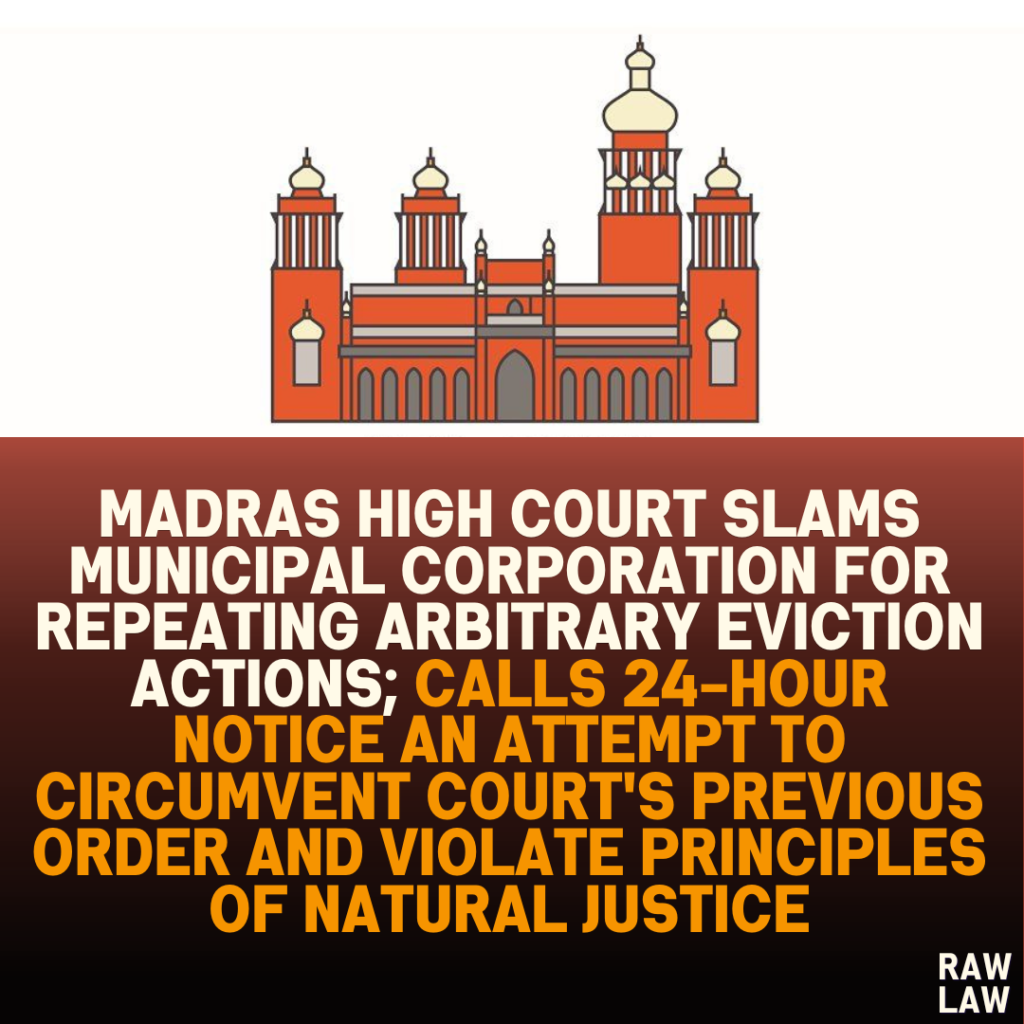Court’s Decision:
The Madras High Court quashed the impugned order passed by the second respondent (the Municipal Corporation) that directed the petitioners to vacate the premises within 24 hours, deeming the action arbitrary and highhanded. The court emphasized that the second respondent acted in violation of the earlier order by repeating the same impugned actions. It directed the Corporation to de-seal the premises immediately and provide a report on why only 24 hours were given for eviction. The court warned that any further violation of its order would be treated as contempt of court.
Facts:
- The petitioners, husband and wife, run a business in the name “Metro Bazaar” at the Municipal Shopping Complex in Krishnagiri.
- The premises were leased out by the Municipal Corporation from 2009, with the lease periodically extended along with rent hikes.
- On September 27, 2024, the second respondent issued an order directing the petitioners to vacate the premises within 24 hours, which led the petitioners to file an earlier writ petition in W.P.No.29463 of 2024.
- In the previous petition, the court quashed the eviction order, noting that it was passed without granting the petitioners an opportunity to present their case. The second respondent was directed to follow due process under Rule 302 (2) of the Tamil Nadu Urban Local Bodies Rules and to pass a new order within two weeks.
- The current petition was filed in response to a fresh order passed on October 4, 2024, which again directed the petitioners to vacate within 24 hours, without giving any valid reasons for the urgency.
Issues:
- Whether the second respondent acted in violation of the earlier order by repeating the same actions without providing due process to the petitioners.
- Whether the 24-hour notice period given to vacate the premises was justified under the law.
Petitioner’s Arguments:
- The petitioners argued that the second respondent did not follow the court’s directions in the earlier order and repeated the same actions without providing a proper hearing.
- They contended that the lease was revoked arbitrarily without valid reasons, and the subsequent 24-hour notice period was unreasonable.
Respondent’s Arguments:
- The respondents argued that the action was taken in compliance with the Local Body Acts and Rules, and there was no malicious intent.
- They requested the court to excuse the appearance of the second respondent, stating that the order was passed only to ensure compliance with the law.
Analysis of the Law:
The court referred to Rule 302 of the Tamil Nadu Urban Local Bodies Rules, which mandates that revocation or suspension of a license can only be done after providing sufficient notice and an opportunity for the affected party to respond. The rule requires the Commissioner to consider any response and provide a hearing before taking any final action. The court noted that the second respondent did not adhere to these procedures.
Precedent Analysis:
The court cited its own previous order in W.P.No.29463 of 2024, where it had quashed the earlier eviction order, emphasizing that any revocation or suspension should follow due process, and repeated violations would attract serious consequences.
Court’s Reasoning:
The court criticized the second respondent for its highhandedness and arbitrary actions, highlighting that despite clear directions in the earlier judgment, the respondent repeated the same mistakes without justifiable grounds. It concluded that the 24-hour notice period was a clear attempt to circumvent the earlier ruling and showed a lack of adherence to the principles of natural justice.
Conclusion:
The court directed the second respondent to de-seal the premises immediately and to submit a report explaining the legal basis for providing only 24 hours for eviction. The court set the next hearing for October 9, 2024, warning that any further violations would be treated as contempt.
Implications:
The decision reinforces the requirement for municipal authorities to follow due process before evicting tenants, ensuring that even statutory bodies are not exempt from adhering to principles of natural justice. The ruling serves as a reminder that highhanded actions without valid reasons will not be tolerated by the judiciary.




Pingback: Madras High Court Grants Interim Injunction Restraining 8th Respondent from Alienating Property Due to Alleged Fraudulent Agreement: “If It Is Established That 8th Respondent Played a Role in Defrauding the Petitioner, the Sale Will Be Vitiated” - Raw
Pingback: Patna High Court Directs the Payment of ₹58,56,670/- for Supplied Medicines and Medical Equipment; Denial of Payment by Authorities Held Arbitrary and Unjust Enrichment - Raw Law